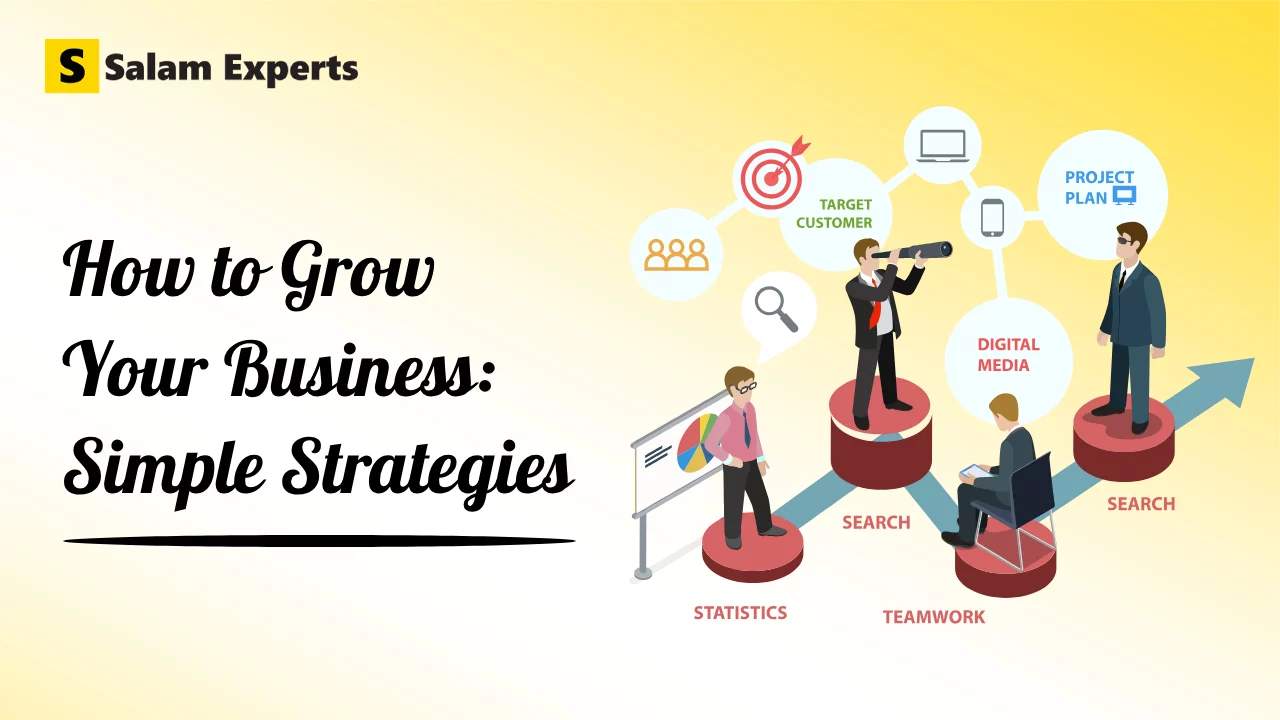How to Grow Your Business: 8 Simple Strategies

In the world of business that’s always changing, getting bigger is not just a dream – it’s something you have to do to be really successful. If you plan how to get bigger really carefully, it can make your company go really high. In this big guide, we’re going to talk about the best ways to make your company grow and last a long time. We’ll talk about things like selling in different places, coming up with new ideas, getting bigger, and other important ways to make a company do well.
As we go along, we’ll show you examples from real life and give you practical advice. We’ll help business owners and leaders learn how to grow their companies. We’ll also talk about the problems and mistakes that can happen with each strategy and give you advice on how to choose the best way to grow, depending on what kind of business you have and what’s going on in the world. Let’s start by talking about what a growth strategy is all about.
Understanding Growth Strategies
A growth strategy is a meticulously crafted blueprint that businesses employ to attain sustainable expansion. It serves as a roadmap, delineating how a company intends to grow, enhance profitability, and gain a competitive edge. The significance of a well-defined growth strategy cannot be overstated—it offers direction and purpose, shaping every decision and action towards the realization of long-term prosperity.
The Merits of Growth Strategies
Embarking on a growth strategy can yield an array of advantages for businesses. Tangible benefits encompass augmented revenue, the broadening of market reach, and heightened profitability. On the intangible front, it entails an enhanced brand reputation, deeper customer loyalty, and greater adaptability in a perpetually shifting market landscape.
Pitfalls and Challenges of Growth Strategies
While growth strategies promise substantial rewards, they do not come without their share of trials and potential pitfalls. Common hurdles include resource constraints, market unpredictability, and escalated competition. Nonetheless, with meticulous planning and execution, these obstacles can be surmounted, and risks can be mitigated.
The Vitality of Growth Strategy
Growth strategies occupy a pivotal role in the corporate realm due to their role in ensuring sustainability, fortifying competitiveness, and steering companies toward enduring prosperity. They empower businesses to broaden their horizons, attain a competitive edge, and amplify revenue by expanding their customer base and market presence.
By actively pursuing growth, companies can aspire to ascend to industry dominance, mold market trends, and diversify their portfolios to minimize risks. Growth strategies frequently demand innovation, not only to maintain relevance but also to attract top talent seeking professional opportunities. In essence, growth strategies form the bedrock of a company’s capacity to thrive, adapt, and flourish in the ever-evolving business landscape.
Enhancing Business Growth through Consultation
A business growth consultant plays a pivotal role in elevating a company’s growth endeavors and strategies. These professionals offer an impartial evaluation of your business, pinpoint growth prospects, and collaboratively craft customized plans that align with your objectives. Armed with market research, problem-solving acumen, and extensive networks, consultants furnish invaluable insights and connections.
They assist in risk mitigation, financial optimization, operational streamlining, and the refinement of marketing and sales strategies. Their counsel on employee development and measurable metrics ensures progress tracking. By leveraging their expertise, businesses can conserve time and resources while expediting their voyage toward sustainable growth and success, all the while adapting to the ever-shifting market dynamics.
Choosing the Right Growth Path
Selecting the most apt growth strategy hinges on various factors, including industry dynamics, market conditions, and a company’s resources and competencies. Informed decisions require entrepreneurs to possess a lucid comprehension of their objectives and a well-defined decision-making framework.
1.Market Penetration
Market penetration, a strategy fixated on optimizing existing markets, entails businesses increasing their market share by vying for a larger slice of their current customer base. Achieving this involves rigorous customer analysis, price strategy adjustments, product or service enhancements, data-driven marketing optimization, sales channel expansion, competitive analysis, soliciting customer feedback, staying attuned to market trends, prioritizing customer retention, and exploring strategic partnerships.
Through astute implementation of these tactics, businesses can tap into the latent potential of their existing market, solidify their position, and attain sustainable growth.
2.Product Development
Continual innovation and refinement of products or services are paramount for sustainable business expansion. Innovation equips companies to remain relevant in dynamic markets, meet evolving customer demands, secure a competitive advantage, augment market share, diversify revenue streams, attract investments, and reshape industries.
Exemplary companies like Apple, Tesla, Amazon, Netflix, and Google underscore how prioritizing innovation leads to remarkable growth. These companies continuously launch new and improved offerings, cementing their status as industry leaders and capturing new markets.
3.Market Development
Market development is a strategy that revolves around extending a business’s footprint by entering new geographic territories or targeting diverse customer segments within existing markets. This approach allows companies to exploit untapped opportunities and augment revenue. For instance, a fashion retailer may venture into international markets, catering to consumers in new countries or regions.
By adapting their products and marketing strategies to harmonize with local preferences and needs, they can effectively penetrate these markets and achieve growth.
4.Strategic Alliances and Partnerships
Strategic alliances and partnerships entail collaborative efforts where businesses pool resources with other firms to pursue shared objectives. Such alliances can provide access to fresh resources, markets, or technology. An archetypal instance is the partnership between Microsoft and Intel, which gave rise to “Wintel” PCs, dominating the personal computer market for an extended period.
Another illustration is the strategic alliance between Starbucks and Spotify, offering patrons personalized music experiences in Starbucks establishments. Prosperous partnerships such as these can drive business growth by leveraging combined strengths and expanding reach.
5.Franchising
Franchising is a growth strategy that enables businesses to scale rapidly by granting franchisees the privilege to operate under their brand. Franchisees reap the benefits of an established brand, operational support, and a proven business model. Eminent franchise success stories encompass McDonald’s, Subway, and Starbucks. These franchises have achieved global expansion, harnessing local entrepreneurship while upholding uniform brand standards. Franchising represents a potent growth strategy for businesses aiming to escalate without substantial capital investments.
6.Market Segmentation
Market segmentation entails partitioning a broad market into smaller, specialized segments based on characteristics such as demographics, psychographics, or behavior. By tailoring products and marketing messages to cater to the unique needs and preferences of each segment, businesses can enhance their relevance and competitiveness.
For example, a cosmetics company may target different age groups with distinct skincare lines. Effective segmentation enables businesses to forge deeper connections with customers, potentially leading to heightened sales and loyalty.
7.Customer Retention and Loyalty Programs
Customer retention stands as a linchpin for sustained growth. Cultivating enduring relationships with existing customers not only diminishes the cost of acquiring new ones but also fosters brand loyalty. The implementation of effective customer loyalty programs, like rewards initiatives, exclusive offers, or personalized experiences, can incentivize customers to remain loyal.
Airlines like Delta and hotel chains like Marriott excel in this domain, offering frequent flyer and loyalty programs that keep customers coming back and contributing to their growth.
8.Cost Leadership and Efficiency
Cost leadership and operational efficiency are fundamental to achieving growth while preserving profitability. Businesses must perpetually seek avenues to manage costs without compromising product quality. This might entail streamlining supply chains, adopting lean manufacturing practices, or implementing cost-saving technologies.
Retail giants like Walmart have mastered cost leadership by optimizing their logistics and supply chain operations, enabling them to furnish competitive prices to customers and fuel growth.
The Components of an Effective Business Growth Strategy
A successful business growth strategy that embodies a meticulously designed plan outlining the company’s trajectory toward expansion, augmented profitability, and competitive prowess. Such a strategy is indispensable for long-term success and should exhibit several key characteristics.
1.Alignment with Business Goals
A growth strategy should harmonize with the overarching goals and objectives of the business. It ought to take into account the company’s mission, vision, and core values to ensure cohesiveness and clarity in the pursuit of growth opportunities.
2.Market-Centric Approach
A thriving growth strategy revolves around comprehending and satisfying customer needs. It entails thorough market research to pinpoint opportunities, trends, and target demographics. Customer input and market insights should guide decision-making.
3.Sustainability
In the contemporary business landscape, sustainability is non-negotiable. Growth strategies must be sustainable over the long haul, taking into account environmental, social, and economic factors. Sustainable growth benefits not only the company but also society and the environment.
4.Differentiation
To stand out in a competitive market, a growth strategy should underscore what sets the business apart from rivals. Be it through product innovation, exceptional customer service, or distinctive branding, differentiation is pivotal.
5.Flexibility and Adaptability
The business environment is dynamic, and effective growth strategies are supple and adaptable. They should permit adjustments in response to shifting market conditions, customer preferences, and emerging opportunities or threats.
6.Resource Allocation
A growth strategy should elucidate how resources—financial, human, and technological—will be allocated to support growth initiatives. Efficient resource management is indispensable for success.
7.Risk Management
Every growth strategy entails inherent risks. Effective strategies acknowledge these risks and incorporate mitigation plans. Striking a balance between calculated risks and potential rewards is imperative.
8.Measurable Objectives
Growth objectives should adhere to the SMART criteria—specific, measurable, achievable, relevant, and time-bound. This ensures precision in goal-setting and offers a foundation for performance evaluation.
9.Continuous Improvement
A growth strategy should cultivate a culture of perpetual improvement. Feedback loops and regular reviews enable adjustments and refinements as the strategy unfolds.
10.Clear Communication
Effective communication of the growth strategy to all stakeholders, including employees, investors, and partners, is pivotal. Transparency and engagement cultivate support and alignment.
11.Legal and Ethical Considerations
Growth strategies must operate within legal and ethical boundaries. Compliance with regulations and ethical business practices is essential for preserving trust and reputation.
12.Monitoring and Evaluation
Regular monitoring and evaluation of progress against established metrics and key performance indicators (KPIs) are vital. These assessments help identify areas of success and facets that necessitate improvement.
Conclusion
In summation, sustainable business growth is an attainable objective through well-calibrated growth strategies. By delving into these strategies and understanding their intricacies, entrepreneurs and corporate leaders can chart a course toward sustainable expansion, ensuring the vitality of their enterprises in a perpetually evolving market landscape. The journey may be arduous, but with the right strategy, dedication, and adaptability, success awaits those who dare to grow.
FAQs
A business growth strategy is a carefully planned approach that outlines how a company intends to expand, increase profitability, and gain a competitive edge. It serves as a roadmap for achieving sustainable growth and success.
Growth strategies are essential for businesses because they enable sustainability, enhance competitiveness, and drive long-term success. These strategies allow companies to expand, gain a competitive advantage, and increase revenue through the expansion of customer bases and market presence.
Implementing a growth strategy can bring numerous benefits to businesses, including increased revenue, market share expansion, enhanced profitability, improved brand reputation, stronger customer loyalty, and greater adaptability in a changing market.
Common challenges and pitfalls of growth strategies include resource constraints, market uncertainties, and increased competition. However, with careful planning and execution, these challenges can be overcome, and risks can be minimized.
A business growth consultant plays a crucial role in enhancing a company’s growth efforts. They offer an impartial evaluation of the business, identify growth opportunities, develop tailored plans, provide market research, optimize finances, streamline operations, and offer guidance on employee development and measurable metrics.
Author
-

We are a digital marketing agency with over 17 years of experience and a proven track record of helping businesses succeed. Our expertise spans businesses of all sizes, enabling them to grow their online presence and connect with new customers effectively. In addition to offering services like consulting, SEO, social media marketing, web design, and web development, we pride ourselves on conducting thorough research on top companies and various industries. We compile this research into actionable insights and share it with our readers, providing valuable information in one convenient place rather than requiring them to visit multiple websites. As a team of passionate and experienced digital marketers, we are committed to helping businesses thrive and empowering our readers with knowledge and strategies for success.
View all posts




